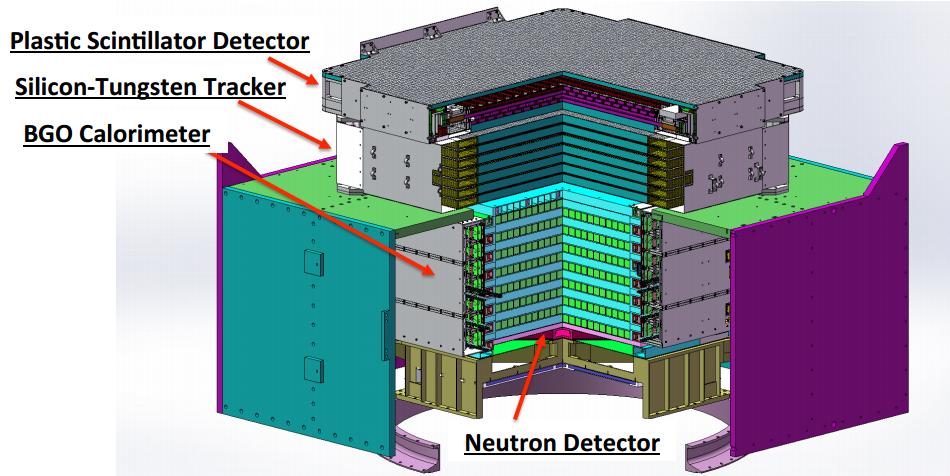

Artist's rendering of DAMPE satellite. Image Credit: dpnc.unige.ch
Chinese scientists announced on Friday that they plan to launch the country’s first ever dark matter probe by the end of this year. The satellite named DAMPE (DArk Matter Particle Explorer) is designed to detect electrons and photons with unprecedented energy resolution in order to identify possible dark matter signatures.
“DAMPE satellite will observe the direction, energy and electric charge of high-energy particles in space in search of dark matter,” said Chang Jin, chief scientist of the project, at a press briefing held by the Shanghai Engineering Center for Microsatellites (SECM).
Chang added that DAMPE will have the widest observation spectrum and highest energy resolution of any dark matter probe in the world.
It will also measure the flux of nuclei which will bring new insights to the origin and propagation high energy cosmic rays. With its excellent photon detection capability, the DAMPE mission is also well placed for new discoveries in high energy-ray astronomy as well.
DAMPE will consist of a Plastic Scintillator strip Detector (PSD) that serves as anti-coincidence detector and charge detector, a Silicon Tungsten tracker-converter (STK) that measures the direction of incident particle, a BGO imaging calorimeter that measures the energy with high energy resolution, and a Neutron Detector (NUD) that gives types of high energy particle shower.

The design of DAMPE satellite. Image Credit: Chinese Academy of Sciences
SECM revealed that all key components of the satellite have been tested and are functioning well.
DAMPE has a mass of about 1,900 kg and is designed to function for 3 years. It will be inserted into a sun-synchronous orbit at the altitude of 500 km.
The satellite is expected to be launched from the Jiuquan Satellite Launch Center in the Gobi desert.
The mission is one of the five Chinese scientific space science missions within the framework of the Strategic Pioneer Program on Space Science of the Chinese Academy of Science (CAS) approved in 2011.
China is building the probe in collaboration with the University of Geneva (Switzerland) and Italian universities in Bari, Lecce, and Perugia.
Dark matter is a hypothetical kind of matter that cannot be seen with telescopes but accounts for most of the matter in the universe. It is one of the most important mysteries of physics. Scientists postulate its existence based on the law of universal gravitation, but have never directly detected it. (Spaceflight Insider)

86-10-68597521 (day)
86-10-68597289 (night)

86-10-68511095 (day)
86-10-68512458 (night)

cas_en@cas.cn

52 Sanlihe Rd., Xicheng District,
Beijing, China (100864)

